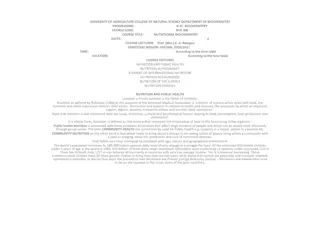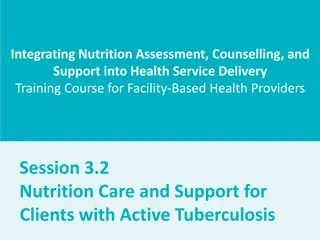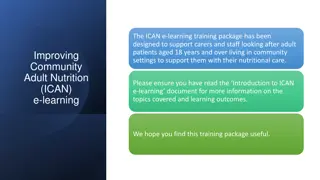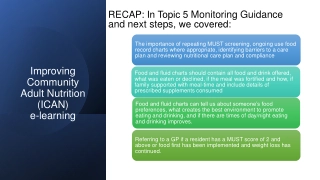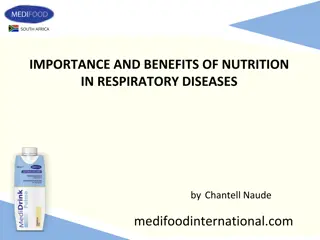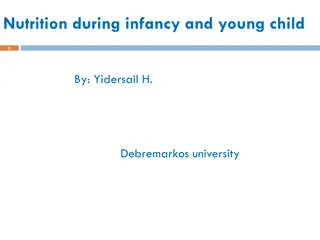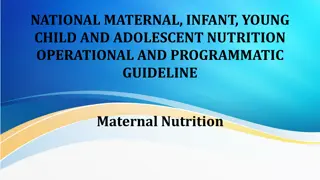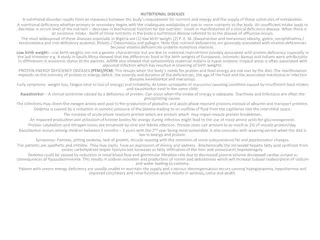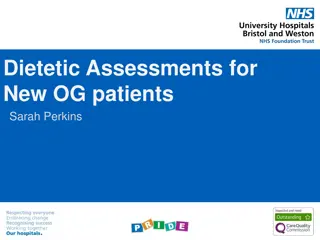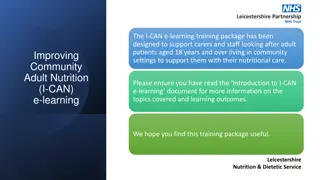Nutrition Champions: Improving Nutritional Care in Health and Social Settings
Nutrition Champions play a vital role in promoting food and drink as essential components of care packages in various settings. Their goal is to enhance nutritional and hydration care, share best practices, facilitate behavior change, and improve access to healthy food and fluids. The content discusses factors influencing food choices, key questions for assessing nutritional status, and the 10 key characteristics of good nutritional care.
Download Presentation

Please find below an Image/Link to download the presentation.
The content on the website is provided AS IS for your information and personal use only. It may not be sold, licensed, or shared on other websites without obtaining consent from the author. Download presentation by click this link. If you encounter any issues during the download, it is possible that the publisher has removed the file from their server.
E N D
Presentation Transcript
Insert organisations logo Nutrition Champions
Thank you for agreeing to become a Nutrition Champion One of the aims of Nutrition and Hydration Week is to have a nutrition champion in all settings in health and social care. The purpose of this person is to promote food and drink as an essential part of someone s care package.
Aim of Nutrition Champions The aim of Nutrition Champions is to improve nutritional & hydration care in community, social and healthcare settings. The objectives for Nutrition Champions are: To provide staff with the tools to develop and enhance their establishment s practices on nutrition, hydration and eating. To help staff find ways to change the habits & practices where required and further develop good practices. To share practices and ideas, and encourage partnership working. To provide evidence of the practical impact of their role in their workplace. The Nutrition Champions role is to: To embed the principles of the 10 Key Characteristics of Good Nutritional Care in the workplace. To improve people s ability to access healthy food and fluids which meet their nutritional requirements and are appropriate for their stage of life.
Influences on food choice Task 1 What factors influence a persons food choice?
The As Access Availability Ability Affordability Awareness Aspiration Assessment Assumption Appetite ASK
7 Key Questions Able to shop or go out to access food? Able to prepare/ access 3 meals? Able to prepare/ access 2 snacks? Able to prepare /access 6-8 hot/ cold drinks? Able to feed/drink self? Good oral health? Consider teeth, mouth, swallowing ability? Weight stable? Consider unintentional weight loss / gain, underweight or frail, overweight or immobile?
Group Discussion What goes in your shopping basket? What is your favourite meal you cook or enjoy? What would it mean if you never ate this again?
Eatwell Guide Think about the food you eat each day and how important the Eatwell Guide is
Eat for Health Key Messages Base your meals on starchy foods Eat lots of fruit and vegetables Eat more fish Cut down on saturated fat and sugar Eat less salt Get active and be a healthy weight Drink fluids regularly Don t skip Breakfast
Eat for Health Promoting different messages using the Eatwell guide: Offer people 3 - 4 meals per day with additional snacks if appropriate Promote foods rich in starch and fibre throughout the day Promote adequate protein intake 2 3 portions Promote fruit and vegetables (5 a day) Promote adequate calcium and vitamin D to support bone health
What is the correct portion size ? Its in your hands .. A palm for the protein size cooked meat , fish etc A fist size for the carbohydrate .. Potatoes, pasta rice etc. The other half of the plate should be vegetables or salad.
How much fluid a day? To stay well hydrated: Men need to drink at least 2 litres (31 2 pints) of fluid every day. Women need to drink at least 1.6 litres (almost 3 pints) of fluid every day.
At least daily, small BUT regular 8 cups (200mls) 1.6 litres or <3pints more for men On rising Breakfast AM Lunch 200mls Water 200mls OJ 200mls Tea 200mls Tea 1 3 4 2 Supper Bedtime PM Dinner 200mls Milk 200mls Hot Choc 200mls Smoothie 200mls Coffee 5 6 8 7
Making Mealtimes Matter - Enriching values Manage the environment to allow customers to eat in a welcoming, clean and tidy area Ensure a relaxed atmosphere to enjoy the meal experience Assist customers who require help with eating and drinking Limit non-essential interruptions to focus on providing support at meal times Staff and visitors recognise the importance of meal times as part of basic care Check out the Mealtimes Matter Tips for embedding this in your organisation
Thank you Presentation prepared by Nutrition and Hydration Week - Making a difference every day



